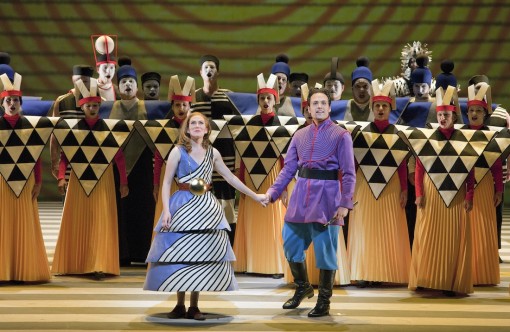San Francisco Opera’s “Magic Flute” winningly blends quirky design with high tech
The cast list may be impressive but the principal name on San Francisco Opera’s new production of Mozart’s The Magic Flute is that of visual artist Jun Kameko.
Born in Japan and based in Omaha, the 69-year-old artist was given full rein to create a new production of Mozart’s timeless Masonic fantasy and it is his colorful tableaux that dominate this production, heard Thursday night.
The production relies on high-tech animation as well. Over the overture, red grid-like lines appear and fill the screen suggesting a busy, minimalist subway map created by Etch-A-Sketch.
The primary motifs draw on Asian influences—aptly for this work—as well as Kabuki theater. Though some costuming flirted with garish tack (the Ladies, Papageno and Papagena), there is an internal logic and consistency to the sets and costumes. While not everything worked, the artless innocence, whimsy and goofy charm of Kaneko’s style with its primary colored lines, ovals and polka dots eventually wins you over. And even the most unregenerate purist could fail to love the two-headed dragon puppet and the globe-like outfits for Papageno and Papagena’s brood of little hatchlings.
Actually, the English translation proved more jarring. David Gockley’s lyrics and couplets were translated with great skill and mostly faithfulness (“man and man and wife and wife” a nod to the city by the bay’s demographics). Less successful was the freewheeling reworked dialogue, which fitfully crossed from slangy vernacular (“boy toy,” “drag show”) to crassness, as with Pamina’s comment about Papageno’s body odor and, especially, some dubious created dialogue for Monostatos’s jive-talking henchmen replacing the entrance scene of the Moor and the captive Pamina. What is the point?
Experience is often the key ingredient in Mozart, and, unsurprisingly, Nathan Gunn delivered the standout performance of the evening as Papageno. Even with Kaneko’s green checkerboard leotard costume for the earthy birdcatcher, the baritone was unfazed, delivering the comedy with seasoned assurance and singing with equal ease in his dark, firmly focused tone.
After passing on the top notes in Dies Bildnis (Oh, image), Alek Shrader improved substantially as the performance unfolded. The young tenor’s career is on the fast track and Tamino seems an especially apt role for Shrader, who brought the right dashing presence, youthful ardency and vocal gleam to the role.
In her company debut, Albina Shagimuratova got off to a shaky start, negotiating the coloratura leaps of O zittre nicht with variable pitch even at a cautious tempo. As is so often the case in this role, the Russian soprano rebounded successfully in her Act 2 aria, sounding much more assured in the stratospheric top notes, and delivering them in thrilling fashion with rich tone and pinpoint precision.
Blond and petite, Heidi Stober brought an Alice in Wonderland look to Pamina but little gentleness or charm, her hyper portrayal coming across as more of an overcaffeinated tomboy than imperiled heroine. The soprano has an attractive voice but sounded vocally miscast, with a hectoring, short-breathed Ach, ich fuhls.
Kristinn Sigmundsson was an imposing figure as a Mikado-like Sarastro, though his sonorous bass tended to lose focus in the role’s subterranean region. As Monostatos, Greg Fedderly made a funny and endearing loser of a villain, showing some nifty balletic moves when Papageno’s “bells” set him dancing.
David Pittsinger was an authoritative Speaker, Nadine Sierra a sexy if unevenly projected Papagena. Melody Moore, Lauren McNeese and Renee Tatum proved a wonderfully characterful trio of Ladies.
Making his SFO debut, Rory MacDonald proved an efficient hand in the pit, apart from some passing odd balances and ensemble roughness. The Yamaha keyboard glockenspiel may be closer to what Mozart had in mind but sounded decidedly tinny and approximate in tone. The San Francisco Opera Chorus sang with firm projection and refined corporate gleam.
The Magic Flute runs through July 8. sfopera.com; 415-864-3330.
